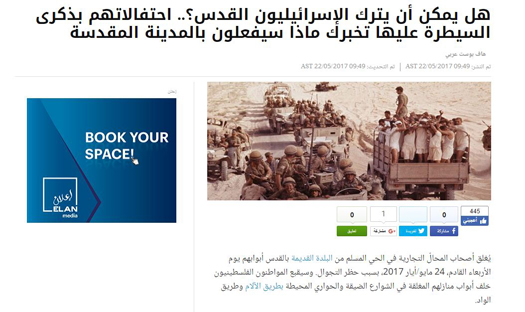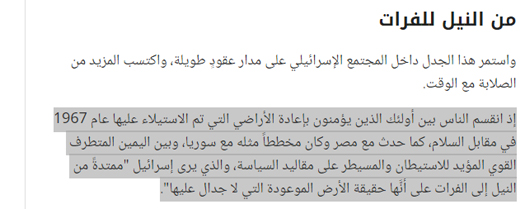A May 22 HuffPost Arabi
article (“Can the Israelis leave Jerusalem? Celebrations of the Anniversary of Their Control Reveals What They Will Do in the Holy City”) about Israel’s May 24 Jerusalem Day celebrations contains fantastical falsehoods, including the false claim that a curfew is imposed on Jerusalem’s Muslim Quarter the day of the Israeli parade marking the city’s unification and that a dominant political strain in Israel envisions the Jewish state stretching from Egypt to Iraq.
First, the article begins with the bogus curfew claim:
Shopkeepers in the Muslim quarter of the Old City of Jerusalem will close their doors on Wednesday, 24 May 2017, due to the curfew. Palestinian citizens will be left behind the doors of their closed houses in the narrow, winding streets surrounding Tariq al Alalam and Tariq Al Wadi.
Micky Rosenfeld, spokesman for the Jerusalem police, confirmed that there was no curfew in the Muslim Quarter or in any other part of the city May 24. He said that stores in the Muslim Quarter closed that day because there were no shoppers during the Israeli march celebrating Jerusalem’s unification. In addition, Arab-owned stores on main thoroughfares including Salah al-Din street were open and served customers. A participant in this year’s flag march confirmed to CAMERA that while there were no Arabs on the specific streets which completely fill up with marchers on the route of the parade, Arabs were going about their usual business on streets not on the parade’s route. Indeed, on the day of the march, Arab residents of the Muslim Quarter can be
seen outside their homes, receiving flowers and messages of peace from the Tag Meir activist organization.

The last record of any curfew in Jerusalem that we can locate dates back to
1988. Before, that, when Jordan controlled eastern Jerusalem, King Hussein imposed curfews in the 1960s, as the
New York Times reported April 22, 2013 from its archives from 50 years earlier (“
1963 King Ends Parliament in Jordan“). In 2013, The Financial Times corrected the false claim that there are curfews in Jerusalem.
In a second fabrication, HuffPost Arabi claims that a strong, influential segment of Israeli society aspires to the expansion of Israel from Egypt to Iraq. HuffPost Arabi writes (screen capture below):
People [Israelis] are divided between those who believe that all the land captured by Israel in 1967 should be given to the Arabs in exchange with peace, as it did with Egypt and planned with Syria, versus the politically strong right-wingers who support the building of settlements and who envision Israel extending from the Nile to the Euphrates, as the undisputed promised land.
The charge that pro-settlement Israelis envision an Israel from the Nile to the Euphrates is a variation on the
long-held Arab myth that Israelis seek a “Greater Israel” stretching across the Middle East. It is also completely baseless and has no place in any Western media outlet which claims to uphold professional standards of journalistic practice.
There is no Israeli political platform, no statement by any influential right-winger and no other substantiation whatsoever for the outrageous claim. Huffington Post last year
published a Reuters article about “ultranationalist Avigdor Lieberman” becoming defense minister, but he has never advocated for an Israel extending from the Nile to the Euphrates. Huffington Post has also published about the “right-wing [Naftali] Bennett,” and neither he nor his
Jewish Home Party advocate for those borders. Eli Yishai’s
Yachad party, which did not pass the 3.25 percent threshold to receive seats in Knesset in the most recent elections, is the most right-wing political party in the current political landscape, and it too did not advocate borders from the Nil
e to the Euphrates. Likewise, Rehavam Zeevi’s right-wing
Moledet party, which advocated the transfer of the Arab population from the West Bank and Gaza Strip to Arab states, did not call for Israeli expansion from Egypt to Iran. In short, it is a fabrication, which along with the Jerusalem curfew falsehood, requires correction.
Finally, in another departure from Western journalistic norms, HuffPost Arabi refers to the Western Wall by its Muslim name, al-Buraq wall. The article even changes the quote of an Israeli politician who refers to the Western Wall, misquoting him as referring to the al-Buraq wall. The Western Wall, the western retaining wall of the Temple Mount, is the most visible surviving remnant of the Temple Mount complex. Due to its proximity the “holy of holies,” which had been located in the First and Second Jewish Temples on the Mount, the Western Wall is the holiest site where Jewish prayer is permitted. Jews are prohibited from praying on the Temple Mount, Judaism’s holiest site. According to
Haaretz, the Muslim name al-Buraq refers to the refers to a
mythological winged horse, which, according to hadith literature, carried the Muslim prophet Mohammed on his Night Journey from Mecca to Jerusalem, and then on to Heaven.
While Buraq’s story dates back to the eighth century, almost at the dawn of Islam, the precise identification of the Western Wall as the spot where Mohammed tethered his mighty steed while he prayed on the Temple Mount is a much more recent tradition, dating to the late Ottoman period.
Thus, while Israeli politician Yair Lapid certainly did not refer to his Jewish father’s Zionistic longing by invoking the Muslim tradition and mentioning “al-Buraq” wall, HuffPost Arabi quotes him as using that language. Huffington Post’s Arabic edition reports:
“The first is the fact that the Zionist dream would not have been complete without the reunification of Jerusalem,” Lapid told the British Observer in the Knesset (Israel’s parliament).
My father was the most secular person you would ever meet in your life, and he was a devoted atheist. After World War II in Europe, he decided to come to this land, not go to the United States or the United Kingdom. He did not come here because of the future commercial buildings in Tel Aviv, but because of his passion for the Tower of the Citadel and the Wall of Buraq, and his desire to connect with the prophets’ places: Jeremiah, Isaiah and Ezekiel. (Emphasis added.)
Here is Yair Lapid’s actual quote, as reproduced in The Guardian, a sister publication of The Observer:
“My father was the most secular person you could ever meet, and a very devoted atheist. He decided when there was a boat in Europe after the [second world] war to come here, not go to the US or the UK.
“Not because [of] the future office buildings in Tel Aviv, but because he had this yearning for the Tower of David and the Western Wall, reconnecting to the places of [the prophets] Jeremiah and Isaiah and Ezekiel. (Emphasis added.)
When UNESCO last year referred to the Western Wall as the “al-Buraq wall,” Haaretz observed:
By naming the area after Mohammed’s steed, the UN also signals it accepts the primacy of Islamic tradition and religious needs over any other faith, belief or even historical fact – since no serious academic would dispute that the Western Wall is part of the retaining wall built by Herod during his reconstruction of the Temple.
By opting for the Muslim moniker for the Western Wall, and even going so far as to change an Israeli politician’s quote, HuffPost Arabi likewise runs roughshod over historical fact as well as journalistic norms.
CAMERA calls on HuffPost Arabi and Huffington Post to correct these errors. Stay tuned for an update.
With research by Ahed Al-Hendi.



